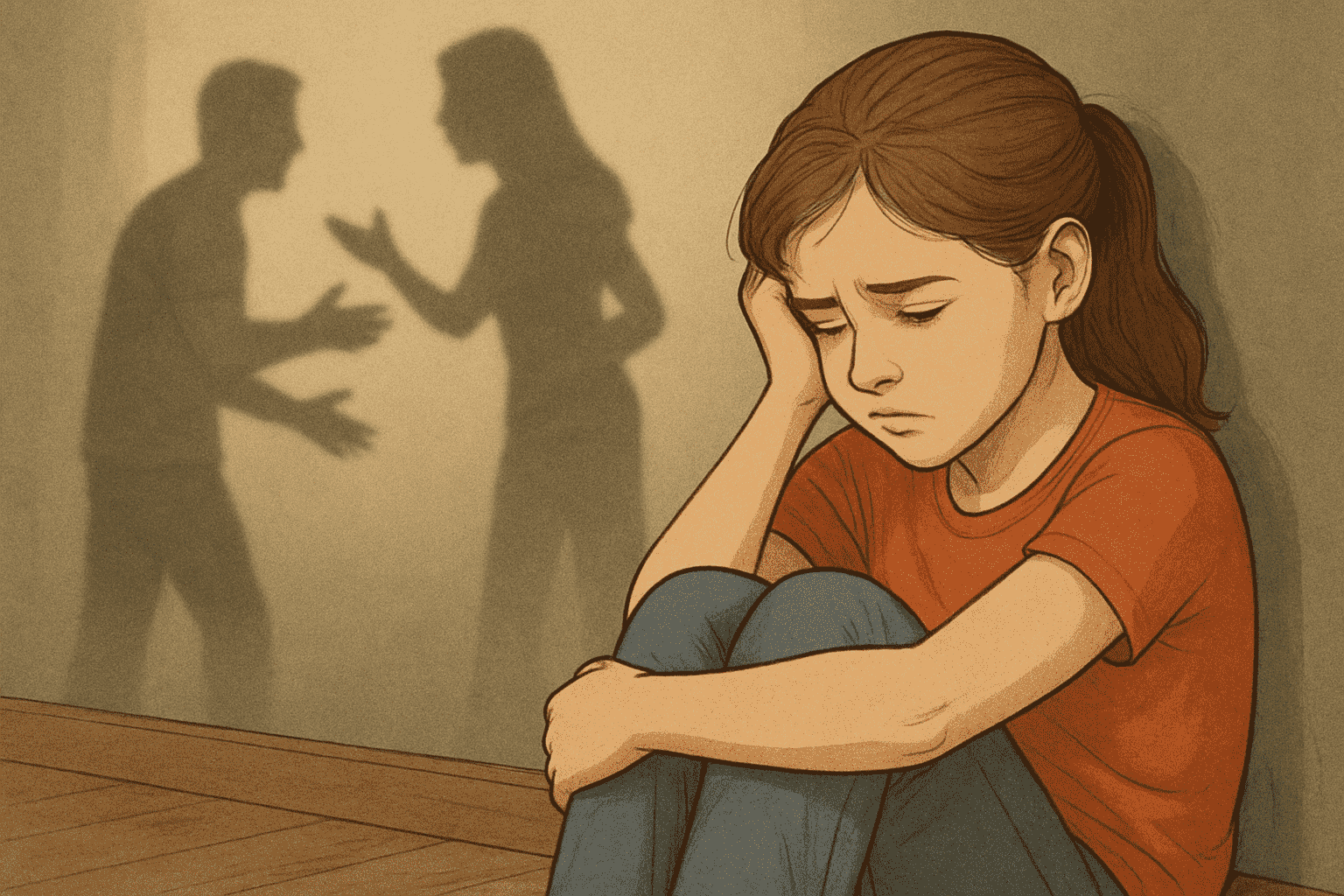In India, where the family is often seen as a sacred institution and the cornerstone of social stability, its breakdown—whether through divorce, separation, abandonment, or prolonged conflict—can have far-reaching consequences. While legal proceedings and social debates around such breakdowns often take center stage, the emotional and psychological toll on children involved tends to be overlooked. For them, the trauma is quiet, insidious, and often long-lasting.
A “broken family” does not necessarily imply only legal divorce; it also includes households with constant parental conflict, one absent parent due to abandonment or death, or even migration-induced separation. These are not uncommon. While India’s divorce rate remains among the lowest in the world—around 1.1% as per Census 2011—urbanization, changing values, and increasing reports of domestic strife have led to more households where children are growing up in emotionally unstable environments.
Children from such families are often subjected to a psychological burden that affects every dimension of their development. One of the most immediate effects is emotional insecurity. Young minds find it hard to comprehend why their caregivers—often perceived as their protectors—are in conflict or absent. This confusion can quickly lead to internalized feelings of abandonment, guilt, or rejection. A 2020 study published in the Indian Journal of Psychiatry found that children from separated families are 3.5 times more likely to develop anxiety disorders and depressive symptoms than their peers from intact households.
In many cases, these children are left to process grief and loss on their own. Emotional neglect can compound the trauma, especially when parents are too consumed by legal disputes, economic challenges, or personal battles. Psychologists report that such children frequently exhibit withdrawal, aggression, or extreme attention-seeking behaviors—either becoming invisible or hyper-visible, both expressions of distress.
The educational impact of this trauma is also significant. According to NIMHANS (National Institute of Mental Health and Neurosciences), children from unstable families show reduced academic performance, poor attendance, and higher dropout rates. Teachers often misinterpret these signs as disobedience or laziness, missing the underlying emotional root. In a society that places high value on academic success, failure at school can further deepen a child’s feelings of worthlessness.
Adolescents, especially, are at a vulnerable crossroads. The already complex journey of forming self-identity becomes fraught when familial role models are absent or dysfunctional. Studies have shown that children from broken homes are at greater risk of engaging in high-risk behaviors, including substance abuse, self-harm, or premature sexual activity. The National Crime Records Bureau (NCRB) has linked many juvenile delinquency cases to unstable home environments.
Gender also influences the processing of trauma. Girls tend to internalize emotional pain, leading to depression, anxiety, and body image issues. Boys, on the other hand, are more likely to express their trauma outwardly, often through aggression or defiance. These behavioral patterns can lay the groundwork for lifelong struggles with trust, relationships, and self-regulation.
In homes where separation follows domestic violence, the scars run even deeper. The National Family Health Survey (NFHS-5, 2019–21) revealed that 31% of ever-married Indian women had experienced spousal violence. For children in such households, witnessing parental abuse can be as traumatizing as experiencing it firsthand. Constant exposure to violence conditions them to accept aggression as a normal mode of interaction, often perpetuating cycles of abuse into adulthood.
Despite these deeply entrenched challenges, India’s mental health infrastructure for children remains woefully inadequate. According to the World Health Organization, India has just 0.75 psychiatrists per 100,000 people—far short of the ideal 3 per 100,000. Child psychologists are even scarcer, especially in government schools and rural areas. A 2022 report by UNICEF emphasized that over 50 million children in India are in need of mental health intervention, yet only a fraction have access to trained professionals.
A qualitative study by the Tata Institute of Social Sciences (TISS) conducted in Mumbai and Pune in 2021 examined the emotional health of 60 children from divorced or separated families. The findings were stark: 74% reported persistent anxiety or depressive symptoms, 61% felt torn between their parents, and more than half showed a marked decline in academic and social engagement. Tragically, fewer than 40% had access to any form of professional counseling.
Part of the problem lies in the stigma surrounding both divorce and mental health. In many Indian communities, a child from a broken home is viewed as “incomplete” or “troubled.” The shame associated with parental separation discourages families from seeking help. Often, children are told to “adjust” or “forget and move on,” denying them the space to grieve or process complex emotions.
To address this silent crisis, a multi-pronged approach is essential. First, mental health awareness must become a part of mainstream educational curricula. Emotional literacy—understanding and articulating feelings—can empower children to seek help early. Teachers should be trained to identify signs of trauma and refer students to appropriate resources.
Second, public schools must have dedicated child counselors. While some private schools in metropolitan cities offer such services, the vast majority of children in India study in government institutions that lack even basic emotional support systems. Government policy must prioritize psychological well-being alongside academic outcomes.
Third, family courts and legal systems should integrate child psychology assessments into custody decisions. Too often, the child’s voice is lost amid parental disputes. Mandatory family counseling and post-divorce co-parenting programs can help minimize the emotional fallout for children. The legal framework must evolve from being adversarial to therapeutic in family law cases.
Community-based initiatives can also play a pivotal role. NGOs and local health workers should be mobilized to provide basic counseling and emotional support in undeserved areas. Peer support groups for children can help normalize their experiences and reduce feelings of isolation.
Media and popular culture, too, have a responsibility. By portraying broken families without stigma and highlighting recovery stories, they can shift public narratives toward acceptance and empathy. Bollywood, with its massive reach, could significantly influence how Indian society views separation and its impact on children.
Lastly, parents themselves need support. Many are navigating their own trauma and may not have the tools to emotionally support their children. Parenting workshops, support groups, and accessible counseling can equip them to manage transitions better and prioritize their children’s emotional well-being.
Children are remarkably resilient, but resilience is not innate—it is nurtured. With proper care, guidance, and emotional support, children from broken families can thrive. They can grow up to break cycles of trauma and become more empathetic and emotionally intelligent adults.
As India strides forward in its ambitions for economic growth and digital transformation, it must not forget the emotional infrastructure required for a healthy society. The children of today will define the India of tomorrow. Recognizing and addressing their silent suffering is not just a matter of social justice—it is a national necessity.
– Dr Beanish Khan
Department of Humanities and social sciences, Madhav University

